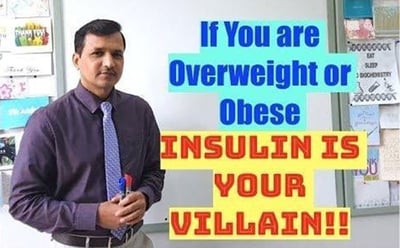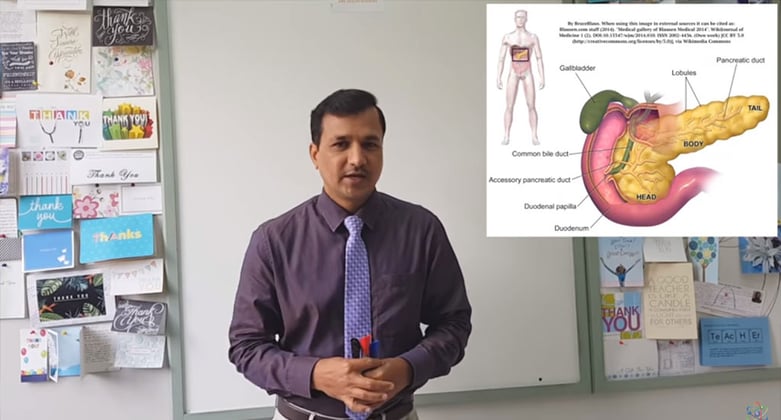 Dr. Prakash Mungli, MD., M.B.B.S., UMHS Chair of Department of Molecular Sciences, Professor of Biochemistry, and Assistant Dean of Student Affairs, created a series of lifestyle medicine videos on YouTube, with such topics as how regular cold showers can help us lose weight and the benefits of intermittent fasting.
Dr. Prakash Mungli, MD., M.B.B.S., UMHS Chair of Department of Molecular Sciences, Professor of Biochemistry, and Assistant Dean of Student Affairs, created a series of lifestyle medicine videos on YouTube, with such topics as how regular cold showers can help us lose weight and the benefits of intermittent fasting.
UMHS faculty member Dr. Mungli, who has also created the popular Facebook group Biochemistry Made Easy, spoke to the UMHS Endeavour about why he created the YouTube series (featuring videos like “How I Make a Green Smoothie” and “Overweight or Obese—Insulin is the Cause”). Dr. Mungli spoke to the Endeavour about everything from how lifestyle changes can help people be healthier to why regular cold showers can help us lose weight to the benefits of intermittent fasting. In addition, he discussed how medical students can cope with stress.
UMHS Endeavour: Tell us why you started creating lifestyle medicine videos?
Dr. Mungli: Since 2015, I was seriously thinking about causes for pre-diabetes and metabolic syndrome. After reading loads of research papers, one thing was sure for me. It is our lifestyle that predisposes us to metabolic syndrome and pre-diabetes, which eventually leads to full-blown diabetes and cardiovascular risks. Getting more in depth into lifestyle medicine, I started to learn many things which are simple but yet not many people follow. I thought of bringing those changes in my lifestyle first, wherever applicable, before preaching to others. This is how I started making videos on lifestyle medicine.
You did a recent video on how regular cold showers can help you lose weight. Can you explain in very simple terms how this works?
 If we go back few decades, our forefathers did not have a luxury of hot showers. They did take cold showers and did perfectly fine and healthy. In simple words regular exposure to cold increases the basal metabolic rate in our cells. This allows cells to burn more food to generate same amount of energy. This means most of the food that we eat will be burned to generate heat and energy, thus less is accumulated as fat in our adipose tissues.
If we go back few decades, our forefathers did not have a luxury of hot showers. They did take cold showers and did perfectly fine and healthy. In simple words regular exposure to cold increases the basal metabolic rate in our cells. This allows cells to burn more food to generate same amount of energy. This means most of the food that we eat will be burned to generate heat and energy, thus less is accumulated as fat in our adipose tissues.
You also did a video in which you talk about the health benefits of intermittent fasting, how it helps our gut microbiota, resets our Circadian clock and more. Can you tell us a little bit about what this type of fasting is and if it’s helpful to people?
Intermittent fasting is not a new thing. This was done by our hunter and gatherer ancestors; they ate when the food was available and fasted when they did not. Our forefathers did this, too. They ate at regular fixed time intervals and worked in the field most of the time in between. Between the meals they are little or nil. There are different types of intermittent fasting, like alternate-day fasting; that means one day fasting and the other day feasting. The most common type of intermittent fasting people follow is 16:8 fasting regimen. That means, in 24-hours, they fast for 16 hours (only plain water is allowed) and eight hours of feeding window.
The principle of intermittent fasting is to keep insulin glucagon ration less than one. By keeping catabolic hormone insulin at high concentration and anabolic hormone insulin at low concentration, the person will be in a catabolic state for 16 hours. During this time, adipose tissue breakdown occurs to release fatty acids from stored triacylglycerol. Fatty acids released from adipose tissues will be metabolized by most cells in our body to generate energy.
Intermittent fasting brings a discipline to our eating pattern. By following a fixed eating regimen, it sets our circadian clock in a positive way. Since people will be following a fixed eating regimen, he/she will be more aware of kind of food that they eat and most of the time then not they bring in a positive change in the kind of food that they eat. Intermittent fasting also brings in a positive change in the gut microbiota because fixed interval of fasting changes the bacterial colony in the intestine. During the eight- hour eating window when the person eats healthy food, including lots of greens and high-fiber, low-calorie fruits with nuts and seeds, it brings a great change in the gut microbiota in a positive way.
Is there anything else you’d like med students to know about all your great videos?
I know medical students are living a stressful life most of the time. Stress can be dangerous on our metabolism and on our cellular functions in a long term. I will be making at-least one video per week on lifestyle medicine, they can subscribe to my channel at https://www.youtube.com/user/PMUNGLI for regular updates on these videos and of-course biochemistry videos. My advice to all students is to take care of your body by eating healthy, exercise whenever possible, and most importantly, sleep well because you need it the most.
About UMHS:
Built in the tradition of the best US universities, the University of Medicine and Health Sciences focuses on individual student attention, maintaining small class sizes and recruiting high-quality faculty. We call this unique approach, “personalized medical education,” and it’s what has led to our unprecedented 96% student retention rate, and outstanding residency placements across the US and Canada. UMHS is challenging everything you thought you knew about Caribbean medical schools.

Scott is Director of Digital Content & Alumni Communications Liaison at UMHS and editor of the UMHS Endeavour blog. When he's not writing about UMHS students, faculty, events, public health, alumni and UMHS research, he writes and edits Broadway theater reviews for a website he publishes in New York City, StageZine.com.
















